领B学习规划 小新星
小新星英语学习计划
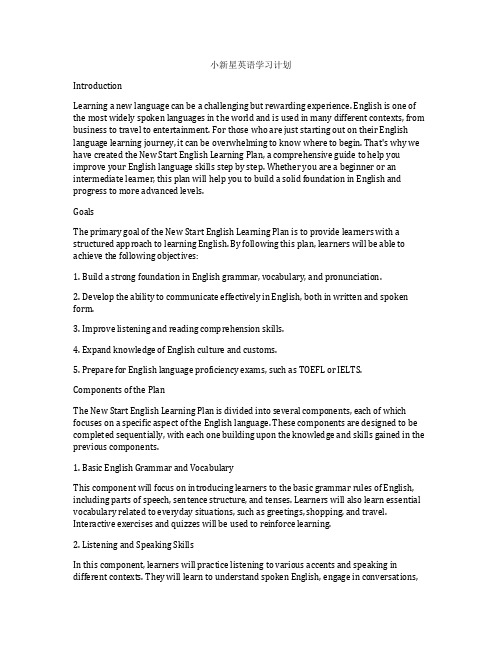
小新星英语学习计划IntroductionLearning a new language can be a challenging but rewarding experience. English is one of the most widely spoken languages in the world and is used in many different contexts, from business to travel to entertainment. For those who are just starting out on their English language learning journey, it can be overwhelming to know where to begin. That's why we have created the New Start English Learning Plan, a comprehensive guide to help you improve your English language skills step by step. Whether you are a beginner or an intermediate learner, this plan will help you to build a solid foundation in English and progress to more advanced levels.GoalsThe primary goal of the New Start English Learning Plan is to provide learners with a structured approach to learning English. By following this plan, learners will be able to achieve the following objectives:1. Build a strong foundation in English grammar, vocabulary, and pronunciation.2. Develop the ability to communicate effectively in English, both in written and spoken form.3. Improve listening and reading comprehension skills.4. Expand knowledge of English culture and customs.5. Prepare for English language proficiency exams, such as TOEFL or IELTS. Components of the PlanThe New Start English Learning Plan is divided into several components, each of which focuses on a specific aspect of the English language. These components are designed to be completed sequentially, with each one building upon the knowledge and skills gained in the previous components.1. Basic English Grammar and VocabularyThis component will focus on introducing learners to the basic grammar rules of English, including parts of speech, sentence structure, and tenses. Learners will also learn essential vocabulary related to everyday situations, such as greetings, shopping, and travel. Interactive exercises and quizzes will be used to reinforce learning.2. Listening and Speaking SkillsIn this component, learners will practice listening to various accents and speaking in different contexts. They will learn to understand spoken English, engage in conversations,and give presentations. Through role-plays and group discussions, learners will gain confidence in their speaking abilities.3. Reading ComprehensionLearners will work on reading a variety of texts, such as articles, stories, and academic papers. They will learn how to extract important information from the texts, infer meaning, and make inferences. Reading exercises will be followed by discussions and written assignments to ensure comprehension.4. Writing SkillsThis component will focus on developing writing skills, including sentence and paragraph structure, grammar, punctuation, and vocabulary. Learners will practice writing different types of texts, such as emails, essays, and reports, and receive feedback from instructors.5. Cultural UnderstandingTo better understand the English language and its usage, learners will delve into the culture, customs, and traditions of English-speaking countries. This will help them to develop a deeper understanding of the language and its context.6. Test PreparationFor those who are preparing for English language proficiency exams, this component will provide guidance on exam format, strategies, and practice tests. Learners will be given tips on how to approach multiple-choice questions, essay writing, and speaking tasks. ScheduleThe New Start English Learning Plan is designed to be completed over a period of six months, with learners devoting approximately 10-15 hours per week to their studies. The following is a sample schedule for completing the plan:Month 1-2: Basic English Grammar and VocabularyMonths 3-4: Listening and Speaking SkillsMonths 5-6: Reading Comprehension, Writing Skills, Cultural Understanding, and Test PreparationUpon completion of the plan, learners should have a strong foundation in English and be ready to take their language skills to the next level.ResourcesIn addition to the structured components of the New Start English Learning Plan, learners will have access to a variety of resources to support their studies. These resources include:- Online learning platform with interactive lessons and exercises- Audio and video materials for listening and speaking practice- Reading materials, such as books, articles, and websites- Writing prompts and assignments- Cultural resources, such as films, music, and documentaries- Practice tests for English language proficiency examsInstructorsLearners will be guided by experienced and qualified instructors who are dedicated to helping them achieve their language learning goals. Instructors will provide regular feedback on assignments, offer support and guidance, and track learners' progress throughout the program.ConclusionThe New Start English Learning Plan is a comprehensive and structured approach to learning English. Whether you are a beginner or an intermediate learner, this plan will provide you with the tools and resources you need to build a solid foundation in English and progress to more advanced levels. By following this plan, you will not only improve your language skills but also gain a deeper understanding of English language and culture. So, if you are ready to take your English language learning to the next level, the New Start English Learning Plan is here to guide you every step of the way. Good luck!。
为什么要选择小新星

为什么要选择小新星学英语全国各地英语培训品牌有几百个,为什么要选择小新星来学英语呢?重要的理由在于:1、小新星的品牌全国驰名。
“小新星”是一个全国性的加盟连锁品牌,现在全国28个省市区的600个城市建有小新星学校,全国小新星学校教职员工近万人,小新星学生近百万。
享有“湖南最有价值培训机构”、“全国最佳连锁化经营培训机构”、“最佳教学模式培训机构”、“中国十大外语教育机构”等一系列荣誉称号。
2、小新星的办学理念科学健康。
小新星的理念认为,中国人学习外语最佳年龄是3—13岁;小新星办学的目的是为了培养中国儿童的英语水平,提高中华民族未来的整体素质,造就国家有用之才;小新星的宗旨是“让每个孩子轻松快捷地获得与世界沟通的能力”。
所以轻松学英语,乐在小新星,快捷学英语,要来小新星。
3、“小新星儿童英语教学法”独领风骚。
小新星儿童英语教学法是小新星在长期的教学和科研活动中,综合国内外著名儿童英语教学流派和方法,结合中国儿童生理和心理特点创造的独特的儿童英语教学方法。
1997年,该方法的初期即被评为长沙市首届科学教研成果一等奖,并于当年通过了湖南省外语教学科研项目鉴定。
十多年来,该方法已经完善和成熟,也被全国各儿童英语培训机构争相效仿。
4、小新星的英语纯正地道。
儿童学英语最担心的是发音不准确,一旦习惯了,很难纠正,贻误孩子一辈子,这是家长们最担心的。
小新星学校的英语教学纯正准确,这是与小新星全国普遍严格要求和不断培训分不开的。
小新星的磁带(VCD)都是由美国外教录音灌制的,小新星也不时选拔全国的教师到加拿大等国进修。
5、小新星的教材丰富多彩。
小新星研究开发了包括《小新星幼儿教材》、《小新星少儿教材》、《小新星高端教材》、《小新星特色教材》四大系列四十多册课堂用的儿童英语培训教材,正在研发近百册小新星阅读系列教材。
小新星的教材满足了3—13岁不同年龄阶段、不同英语基础的儿童课堂内和课堂外学习英语的要求,是自主研发教材最丰富的全国著名儿童英语培训品牌。
步步培优英语学习计划小学

步步培优英语学习计划小学第一步:明确学习目标在开始学习英语之前,我们需要明确学习目标。
例如,是想要提高听说能力,还是想要加强阅读写作能力。
根据不同的学习目标,我们可以制定出不同的学习计划。
第二步:制定学习计划1.每天坚持学习一定时间英语学习需要坚持不懈,每天都要花一定的时间来学习。
可以将学习时间安排在每天的早晨或者晚上,这样能够保证学习的连贯性和坚持性。
2.选择合适的学习材料根据自己的学习目标,选择合适的学习材料,例如英语教材、英语绘本、英语视频等。
3.制定每月学习计划每个月可以制定一个学习计划,列出当月要学习的内容和目标,然后按照计划进行学习。
第三步:学习方法1.听力练习可以通过听英语歌曲、英语广播、英语电影等来练习听力。
还可以下载一些英语听力材料,例如BBC Learning English,VOA Learning English等。
2.口语练习对于口语练习,可以找一些语伴练习口语,也可以通过模仿英语对话来提高口语能力。
3.阅读练习可以通过阅读绘本、英语故事书、英语杂志等来提高阅读能力。
4.写作练习练习写作可以通过每天写日记或者写英语作文来提高写作能力。
第四步:学习环境创造良好的学习环境对于英语学习很重要。
可以选择一个安静的地方,保持良好的学习氛围。
另外,可以选择一些适合学习英语的背景音乐或者白噪音来帮助学习。
第五步:监督和改进在学习过程中,要不断地进行监督和改进。
可以通过定期的测验来检测学习效果,并根据检测结果来进行调整学习计划。
另外,可以找一些英语学习群或者社交平台,与其他学习者交流,互相监督和帮助。
第六步:培养兴趣英语学习是一个长期的过程,要坚持学习,就需要培养兴趣。
可以通过英语歌曲、英语电影、英语游戏等来增加对英语的兴趣,从而更有动力地学习。
总结:英语学习需要坚持不懈,要制定合理的学习计划,并在学习过程中不断地进行监督和改进。
同时,培养对英语的兴趣,可以更好地坚持下去。
希望大家都能够通过自己的努力,成为优秀的英语学习者。
小星星英语学习计划小学
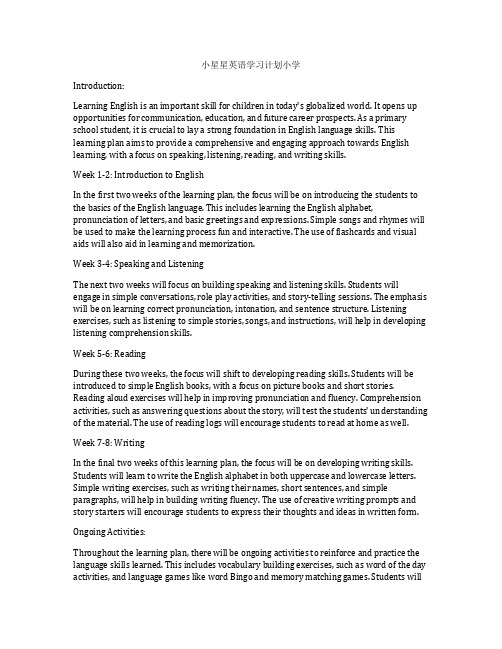
小星星英语学习计划小学Introduction:Learning English is an important skill for children in today's globalized world. It opens up opportunities for communication, education, and future career prospects. As a primary school student, it is crucial to lay a strong foundation in English language skills. This learning plan aims to provide a comprehensive and engaging approach towards English learning, with a focus on speaking, listening, reading, and writing skills.Week 1-2: Introduction to EnglishIn the first two weeks of the learning plan, the focus will be on introducing the students to the basics of the English language. This includes learning the English alphabet, pronunciation of letters, and basic greetings and expressions. Simple songs and rhymes will be used to make the learning process fun and interactive. The use of flashcards and visual aids will also aid in learning and memorization.Week 3-4: Speaking and ListeningThe next two weeks will focus on building speaking and listening skills. Students will engage in simple conversations, role play activities, and story-telling sessions. The emphasis will be on learning correct pronunciation, intonation, and sentence structure. Listening exercises, such as listening to simple stories, songs, and instructions, will help in developing listening comprehension skills.Week 5-6: ReadingDuring these two weeks, the focus will shift to developing reading skills. Students will be introduced to simple English books, with a focus on picture books and short stories. Reading aloud exercises will help in improving pronunciation and fluency. Comprehension activities, such as answering questions about the story, will test the students' understanding of the material. The use of reading logs will encourage students to read at home as well.Week 7-8: WritingIn the final two weeks of this learning plan, the focus will be on developing writing skills. Students will learn to write the English alphabet in both uppercase and lowercase letters. Simple writing exercises, such as writing their names, short sentences, and simple paragraphs, will help in building writing fluency. The use of creative writing prompts and story starters will encourage students to express their thoughts and ideas in written form. Ongoing Activities:Throughout the learning plan, there will be ongoing activities to reinforce and practice the language skills learned. This includes vocabulary building exercises, such as word of the day activities, and language games like word Bingo and memory matching games. Students willalso be encouraged to engage in English language activities outside the classroom, such as listening to English songs, watching English cartoons, and practicing English conversations with their peers.Assessment:At the end of the learning plan, there will be a comprehensive assessment to evaluate the students' language proficiency. This will include a speaking assessment, a reading comprehension test, and a writing assignment. The assessment will provide valuable feedback on the students' progress and identify areas for further improvement.Conclusion:This Starry English Learning Plan aims to lay a solid foundation for English language learning in primary school students. By providing a comprehensive and engaging approach towards language acquisition, students will be equipped with the necessary skills to communicate effectively in English. Through the use of interactive and fun activities, students will develop a love for learning English, setting the stage for future language acquisition and fluency.。
小星星英语学习计划大学
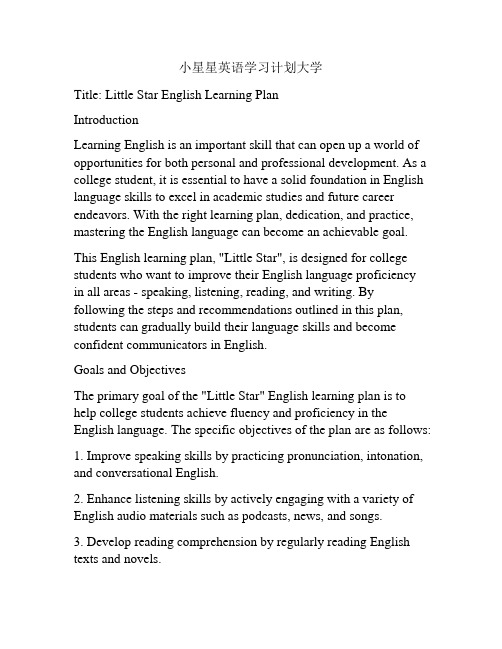
小星星英语学习计划大学Title: Little Star English Learning PlanIntroductionLearning English is an important skill that can open up a world of opportunities for both personal and professional development. As a college student, it is essential to have a solid foundation in English language skills to excel in academic studies and future career endeavors. With the right learning plan, dedication, and practice, mastering the English language can become an achievable goal.This English learning plan, "Little Star", is designed for college students who want to improve their English language proficiencyin all areas - speaking, listening, reading, and writing. By following the steps and recommendations outlined in this plan, students can gradually build their language skills and become confident communicators in English.Goals and ObjectivesThe primary goal of the "Little Star" English learning plan is to help college students achieve fluency and proficiency in the English language. The specific objectives of the plan are as follows:1. Improve speaking skills by practicing pronunciation, intonation, and conversational English.2. Enhance listening skills by actively engaging with a variety of English audio materials such as podcasts, news, and songs.3. Develop reading comprehension by regularly reading English texts and novels.4. Expand vocabulary and grammar knowledge through systematic study and practice.5. Strengthen writing skills by regularly writing essays, reports, and creative pieces in English.The "Little Star" English learning plan is designed to be a comprehensive and well-rounded approach to language learning. The plan is flexible and can be tailored to each individual's needs and learning pace.Weekly Study PlanWeek 1-2: Speaking and Pronunciation- Practice pronunciation of common English sounds and phonemes. - Listen to English speakers and imitate their intonation and rhythm.- Engage in daily English conversations with classmates or language exchange partners.Week 3-4: Listening Skills- Listen to English podcasts, news, and radio shows to improve listening comprehension.- Watch English films with subtitles to practice listening and understanding spoken English.- Take note of unfamiliar words or expressions and look them up in a dictionary.Week 5-6: Reading Comprehension- Read English texts, articles, and short stories to develop reading skills.- Summarize the main ideas and key points of the texts to improve comprehension.- Discuss the content of the readings with peers or instructors to enhance understanding.Week 7-8: Vocabulary and Grammar- Learn new English words and phrases every day and practice using them in sentences.- Review common grammatical structures and rules through grammar exercises and drills.- Use flashcards or online resources to expand and reinforce vocabulary knowledge.Week 9-10: Writing Skills- Write short essays or journal entries in English to practice expressing thoughts and ideas.- Seek feedback from teachers or language partners to improve writing skills.- Edit and revise written work to enhance clarity, coherence, and overall quality.Monthly Study PlanMonth 1: Speaking and Listening- Participate in English conversation groups or clubs to practice speaking and listening skills.- Watch English news broadcasts or listen to English radio programs to expose oneself to different accents and speech patterns. Month 2: Reading and Vocabulary- Read English novels, newspapers, or magazines regularly to build reading comprehension skills.- Learn new vocabulary through reading and keep a vocabulary journal to track progress and review.Month 3: Grammar and Writing- Focus on improving grammar accuracy and complexity in written assignments.- Write longer essays and reports to practice organizing thoughts and arguments in English.Additional ResourcesTo supplement the "Little Star" English learning plan, students can also utilize additional resources and tools to enhance their language skills. These may include:- Language learning apps and websites such as Duolingo, Rosetta Stone, and Memrise for vocabulary and grammar practice.- Online language exchange platforms to connect with native English speakers for conversational practice.- English language courses and workshops offered by college language centers or online education platforms.- Language learning communities and forums for sharing experiences, tips, and resources with other English learners.ConclusionMastering the English language is a valuable asset for college students in their academic and professional pursuits. The "Little Star" English learning plan provides a structured and comprehensive approach to language learning, covering all aspects of language skills - speaking, listening, reading, and writing. By following the plan and incorporating additional resources, students can progress steadily towards fluency and proficiency in English, opening up a world of opportunities for personal and professional growth. With dedication and practice, the goal of becoming a confident communicator in English can be achieved.。
abcreading怎么制定学习计划
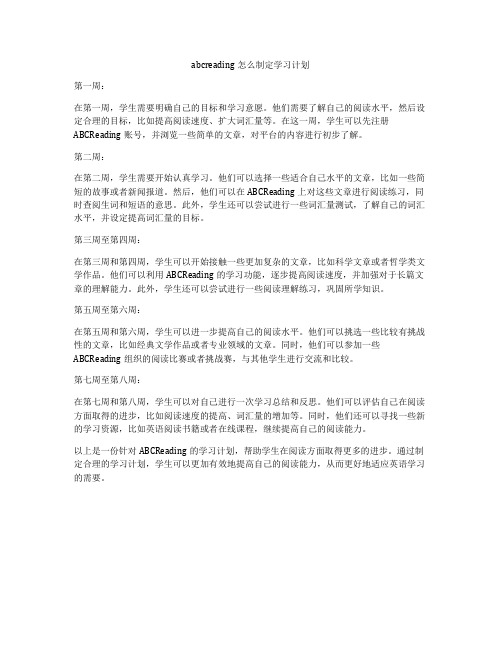
abcreading怎么制定学习计划第一周:在第一周,学生需要明确自己的目标和学习意愿。
他们需要了解自己的阅读水平,然后设定合理的目标,比如提高阅读速度、扩大词汇量等。
在这一周,学生可以先注册ABCReading账号,并浏览一些简单的文章,对平台的内容进行初步了解。
第二周:在第二周,学生需要开始认真学习。
他们可以选择一些适合自己水平的文章,比如一些简短的故事或者新闻报道。
然后,他们可以在ABCReading上对这些文章进行阅读练习,同时查阅生词和短语的意思。
此外,学生还可以尝试进行一些词汇量测试,了解自己的词汇水平,并设定提高词汇量的目标。
第三周至第四周:在第三周和第四周,学生可以开始接触一些更加复杂的文章,比如科学文章或者哲学类文学作品。
他们可以利用ABCReading的学习功能,逐步提高阅读速度,并加强对于长篇文章的理解能力。
此外,学生还可以尝试进行一些阅读理解练习,巩固所学知识。
第五周至第六周:在第五周和第六周,学生可以进一步提高自己的阅读水平。
他们可以挑选一些比较有挑战性的文章,比如经典文学作品或者专业领域的文章。
同时,他们可以参加一些ABCReading组织的阅读比赛或者挑战赛,与其他学生进行交流和比较。
第七周至第八周:在第七周和第八周,学生可以对自己进行一次学习总结和反思。
他们可以评估自己在阅读方面取得的进步,比如阅读速度的提高、词汇量的增加等。
同时,他们还可以寻找一些新的学习资源,比如英语阅读书籍或者在线课程,继续提高自己的阅读能力。
以上是一份针对ABCReading的学习计划,帮助学生在阅读方面取得更多的进步。
通过制定合理的学习计划,学生可以更加有效地提高自己的阅读能力,从而更好地适应英语学习的需要。
小新星英语学校美式音标班教学计划
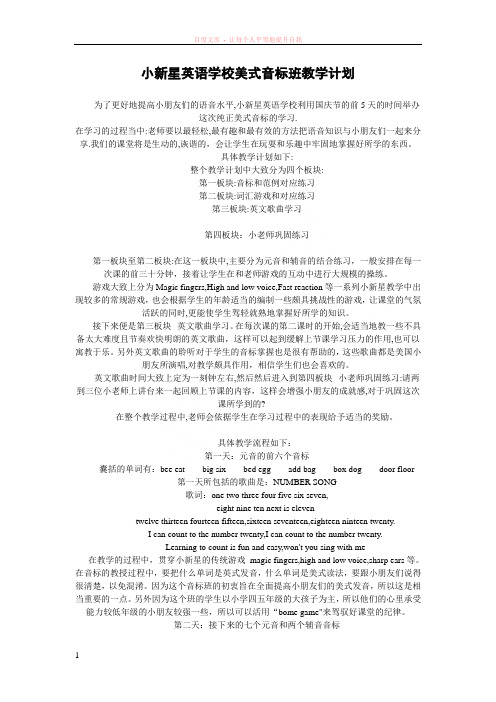
小新星英语学校美式音标班教学计划为了更好地提高小朋友们的语音水平,小新星英语学校利用国庆节的前5天的时间举办这次纯正美式音标的学习.在学习的过程当中:老师要以最轻松,最有趣和最有效的方法把语音知识与小朋友们一起来分享.我们的课堂将是生动的,诙谐的,会让学生在玩耍和乐趣中牢固地掌握好所学的东西。
具体教学计划如下:整个教学计划中大致分为四个板块:第一板块:音标和范例对应练习第二板块:词汇游戏和对应练习第三板块:英文歌曲学习第四板块:小老师巩固练习第一板块至第二板块:在这一板块中,主要分为元音和辅音的结合练习,一般安排在每一次课的前三十分钟,接着让学生在和老师游戏的互动中进行大规模的操练。
游戏大致上分为Magic fingers,High and low voice,Fast reaction等一系列小新星教学中出现较多的常规游戏,也会根据学生的年龄适当的编制一些颇具挑战性的游戏,让课堂的气氛活跃的同时,更能使学生驾轻就熟地掌握好所学的知识。
接下来便是第三板块--英文歌曲学习。
在每次课的第二课时的开始,会适当地教一些不具备太大难度且节奏欢快明朗的英文歌曲,这样可以起到缓解上节课学习压力的作用,也可以寓教于乐。
另外英文歌曲的聆听对于学生的音标掌握也是很有帮助的,这些歌曲都是美国小朋友所演唱,对教学颇具作用,相信学生们也会喜欢的。
英文歌曲时间大致上定为一刻钟左右,然后然后进入到第四板块--小老师巩固练习:请两到三位小老师上讲台来一起回顾上节课的内容,这样会增强小朋友的成就感,对于巩固这次课所学到的?在整个教学过程中,老师会依据学生在学习过程中的表现给予适当的奖励。
具体教学流程如下:第一天:元音的前六个音标囊括的单词有:bee eat big six bed egg add bag box dog door floor第一天所包括的歌曲是:NUMBER SONG歌词:one two three four five six seven,eight nine ten next is eleventwelve thirteen fourteen fifteen,sixteen seventeen,eighteen ninteen twenty.I can count to the number twenty,I can count to the number twenty.Learning to count is fun and easy,won't you sing with me 在教学的过程中,贯穿小新星的传统游戏magic fingers,high and low voice,sharp ears等。
小星星英语学习计划初中
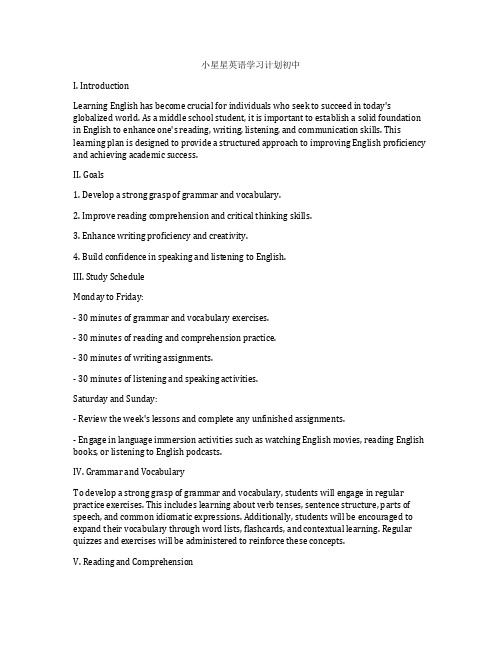
小星星英语学习计划初中I. IntroductionLearning English has become crucial for individuals who seek to succeed in today's globalized world. As a middle school student, it is important to establish a solid foundation in English to enhance one's reading, writing, listening, and communication skills. This learning plan is designed to provide a structured approach to improving English proficiency and achieving academic success.II. Goals1. Develop a strong grasp of grammar and vocabulary.2. Improve reading comprehension and critical thinking skills.3. Enhance writing proficiency and creativity.4. Build confidence in speaking and listening to English.III. Study ScheduleMonday to Friday:- 30 minutes of grammar and vocabulary exercises.- 30 minutes of reading and comprehension practice.- 30 minutes of writing assignments.- 30 minutes of listening and speaking activities.Saturday and Sunday:- Review the week's lessons and complete any unfinished assignments.- Engage in language immersion activities such as watching English movies, reading English books, or listening to English podcasts.IV. Grammar and VocabularyTo develop a strong grasp of grammar and vocabulary, students will engage in regular practice exercises. This includes learning about verb tenses, sentence structure, parts of speech, and common idiomatic expressions. Additionally, students will be encouraged to expand their vocabulary through word lists, flashcards, and contextual learning. Regular quizzes and exercises will be administered to reinforce these concepts.V. Reading and ComprehensionReading comprehension is a crucial skill that contributes to overall academic success. Students will be provided with a variety of reading materials including short stories, articles, and non-fiction texts. Each week, students will be assigned reading passages followed by comprehension questions and critical thinking exercises. This helps students to develop their analytical skills and understanding of different writing styles.VI. Writing AssignmentsWriting proficiency is key to effective communication. Students will be tasked with various writing assignments such as essays, creative writing prompts, and letter writing exercises. Emphasis will be placed on developing coherent and cohesive writing, proper grammar usage, and attention to detail. Additionally, students will receive constructive feedback on their writing, enabling them to improve their skills over time.VII. Listening and SpeakingOral communication is a vital aspect of language learning. To improve listening and speaking skills, students will engage in activities such as listening to audio recordings, participating in group discussions, and delivering presentations. This will help students become more confident in their ability to understand spoken English and communicate effectively in various settings.VIII. Resources and SupportStudents will be provided with a range of resources to support their English learning journey. This includes access to online learning platforms, English language apps, and reference materials. Additionally, students will have the opportunity to seek guidance and support from their teachers, who will be available to provide assistance and answer any questions that arise during the learning process.IX. Evaluation and Progress TrackingRegular assessments will be conducted to evaluate students' progress and identify areas for improvement. This will include quizzes, tests, and performance evaluations on grammar, vocabulary, reading comprehension, writing, and speaking skills. Students will also be encouraged to maintain a portfolio of their work to track their progress and reflect on their learning journey.X. ConclusionBy following this structured English learning plan, middle school students can develop a strong foundation in English language skills. The goal is to equip students with the tools and confidence to communicate effectively, understand complex texts, and excel academically. With dedication and consistent practice, students will be well-prepared to tackle the challenges of learning English and achieve success in their academic endeavors.。
实习生实习计划作文
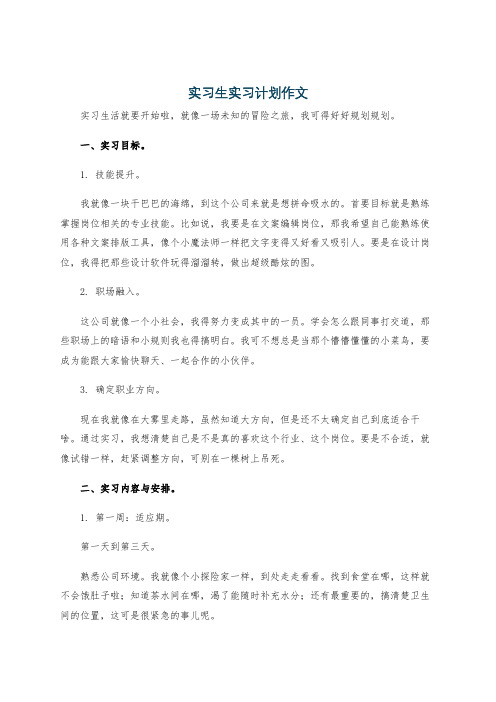
实习生实习计划作文实习生活就要开始啦,就像一场未知的冒险之旅,我可得好好规划规划。
一、实习目标。
1. 技能提升。
我就像一块干巴巴的海绵,到这个公司来就是想拼命吸水的。
首要目标就是熟练掌握岗位相关的专业技能。
比如说,我要是在文案编辑岗位,那我希望自己能熟练使用各种文案排版工具,像个小魔法师一样把文字变得又好看又吸引人。
要是在设计岗位,我得把那些设计软件玩得溜溜转,做出超级酷炫的图。
2. 职场融入。
这公司就像一个小社会,我得努力变成其中的一员。
学会怎么跟同事打交道,那些职场上的暗语和小规则我也得搞明白。
我可不想总是当那个懵懵懂懂的小菜鸟,要成为能跟大家愉快聊天、一起合作的小伙伴。
3. 确定职业方向。
现在我就像在大雾里走路,虽然知道大方向,但是还不太确定自己到底适合干啥。
通过实习,我想清楚自己是不是真的喜欢这个行业、这个岗位。
要是不合适,就像试错一样,赶紧调整方向,可别在一棵树上吊死。
二、实习内容与安排。
1. 第一周:适应期。
第一天到第三天。
熟悉公司环境。
我就像个小探险家一样,到处走走看看。
找到食堂在哪,这样就不会饿肚子啦;知道茶水间在哪,渴了能随时补充水分;还有最重要的,搞清楚卫生间的位置,这可是很紧急的事儿呢。
认识同事。
我会带着我最灿烂的笑容,主动跟大家打招呼,自我介绍的时候尽量说得有趣一点,让大家一下子就能记住我。
比如说,“嗨,我是[名字],我来这儿实习就像超级马里奥进了新的城堡,希望和大家一起愉快闯关。
”第四天到第五天。
了解公司的规章制度。
那些厚厚的文件看起来有点吓人,但我会像看小说一样认真对待。
可不能一不小心就踩了红线,我还想在这儿好好表现呢。
学习岗位的基础工作流程。
跟着带我的师傅后面,像个小尾巴一样,看他怎么做,然后拿个小本子偷偷记下来,回家再复习复习。
2. 第二周第四周:学习期。
第二周。
开始接手一些简单的任务。
比如说整理文件、做一些基础的数据录入。
虽然这些活儿看起来简单,但是我也会做得一丝不苟,就像在雕琢一件艺术品一样。
6岁英语raz学习计划

6岁英语raz学习计划第一阶段:建立基础在孩子6岁的时候,他们正处于对各种学科充满好奇心和求知欲的年龄。
在英语学习领域,我们需要建立孩子的基础,让他们对英语产生兴趣,培养他们的语言能力和表达能力。
1. 每天阅读阅读对于孩子的英语学习至关重要。
我们会每天给孩子准备一本适合他们年龄的英语绘本或故事书,让他们在家里或者学校有指导老师的陪伴下阅读,鼓励孩子自己尝试读出书中的文字,同时教导他们正确的发音和语调。
通过阅读,孩子可以提高自己的词汇量,培养语感和表达能力。
2. 游戏学习我们将引导孩子通过一些英语游戏来学习,比如用英语进行角色扮演游戏,或者在游戏中学习英语歌曲和英语单词。
通过游戏,孩子可以在愉快的氛围中学习英语,树立自信,培养学习兴趣。
3. 歌曲和音乐孩子们喜欢听音乐和唱歌,我们可以通过英语歌曲来帮助他们学习英语。
每周会安排一次唱歌比赛或者表演,让孩子们在音乐中学习英语,同时提高他们的英语口语表达能力。
第二阶段:扩展知识一旦孩子建立了基础,我们将引导他们开始扩展英语知识,学习更多的词汇和语法知识,提高他们的听说读写能力。
1. 单词记忆每天我们将安排一些英语单词让孩子记忆,可以使用图片、卡片或者记忆游戏来帮助他们记忆英语单词。
让孩子们通过不断重复,掌握更多的基础词汇,培养他们的语言记忆力。
2. 句子练习我们会组织一些句子练习,让孩子们通过听力、口语、阅读和书写来学习句子。
通过练习,孩子们能够更好地掌握英语句子的结构和用法。
3. 语法学习在6岁的孩子的英语学习中,语法知识依然要注重,我们会通过故事、游戏和练习来帮助孩子学习一些简单的语法知识,比如名词、动词、形容词的用法等。
让孩子在趣味中学会简单的语法知识。
第三阶段:提高水平在这一阶段,我们将注重提高孩子的水平,使他们能够更自如地运用英语进行交流和表达。
1. 口语训练我们会加强孩子的口语训练,通过让孩子进行英语对话、朗读、表演等方式来提高他们的口语表达能力。
小星星英语学习计划
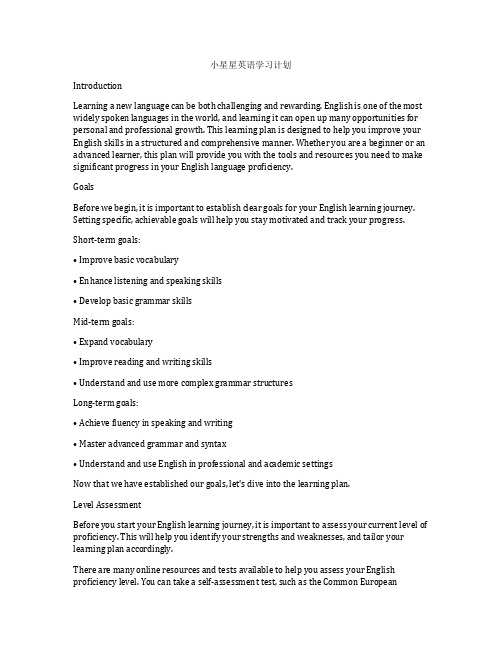
小星星英语学习计划IntroductionLearning a new language can be both challenging and rewarding. English is one of the most widely spoken languages in the world, and learning it can open up many opportunities for personal and professional growth. This learning plan is designed to help you improve your English skills in a structured and comprehensive manner. Whether you are a beginner or an advanced learner, this plan will provide you with the tools and resources you need to make significant progress in your English language proficiency.GoalsBefore we begin, it is important to establish clear goals for your English learning journey. Setting specific, achievable goals will help you stay motivated and track your progress. Short-term goals:• Improve basic vocabulary• Enhance listening and speaking skills• Develop basic grammar skillsMid-term goals:• Expand vocabulary• Improve reading and writing skills• Understand and use more complex grammar structuresLong-term goals:• Achieve fluency in speaking and writing• Master advanced grammar and syntax• Understand and use English in professional and academic settingsNow that we have established our goals, let's dive into the learning plan.Level AssessmentBefore you start your English learning journey, it is important to assess your current level of proficiency. This will help you identify your strengths and weaknesses, and tailor your learning plan accordingly.There are many online resources and tests available to help you assess your English proficiency level. You can take a self-assessment test, such as the Common EuropeanFramework of Reference for Languages (CEFR) or the Test of English as a Foreign Language (TOEFL), to get an idea of your current level.Once you have completed your assessment, you can use the following guidelines to determine your level:• Beginner: You have a very limited understanding of English, and struggle to communicate in basic situations.• Elementary: You can understand and use familiar everyday expressions and basic phrases, but you have difficulty with more complex language.• Intermediate: You can communicate effectively in most everyday situations, but struggle with complex language and unfamiliar topics.• Advanced: You have a strong command of the English language, and can communica te fluently in most situations.Based on your assessment, you can determine which areas of the language you need to focus on, and set appropriate learning objectives.Learning Materials and ResourcesNow that you have assessed your level of English proficiency, it's time to gather the materials and resources you will need for your learning journey. There are many resources available to help you improve your English skills, including books, online courses, language exchange programs, and language learning apps.Here are some recommended resources for each skill area:Vocabulary:• Use flashcards and vocabulary apps to learn and practice new words.• Read English language books, magazines, and newspapers to expand your vocabulary.• Watch English langua ge TV shows, movies, and videos to learn new words and phrases in context.Listening and Speaking:• Use language exchange programs to practice speaking with native English speakers.• Listen to English language podcasts and radio shows to improve your lis tening skills. • Practice speaking English with a language partner or tutor to build confidence and fluency. Grammar:• Use grammar books and online resources to study grammar rules and practice exercises.• Take online grammar quizzes and tests to assess your understanding of grammar concepts.• Use language learning apps to practice grammar exercises and receive instant feedback. Reading and Writing:• Read English language books, articles, and essays to improve your reading comprehension and writing skills.• Write in English regularly, such as keeping a journal or writing essays on different topics.• Use online writing tools and resources to receive feedback on your writing and improve your skills.Self-Study PlanTo make the most of your English learning journey, it is important to create a structured self-study plan that covers all four language skills: listening, speaking, reading, and writing. Here is a sample self-study plan that you can use as a template for your own learning journey:Week 1-2: Vocabulary• Use flashcards or vocabulary apps to learn 20 new words each day.• Read English language books and articles to learn new vocabulary in context.• Watch English language TV shows and movies to learn new words and phrases.Week 3-4: Listening and Speaking• Practice listening to English language podcasts and radio shows for 30 minutes each day.• Use language exchange programs to practice speaking with native English speakers for 30 minutes each day.Week 5-6: Grammar• Study one grammar concept ea ch day, such as verb tenses, prepositions, or conjunctions. • Practice grammar exercises and quizzes to reinforce your understanding of grammar rules. Week 7-8: Reading and Writing• Read English language books and articles for 30 minutes each day to improve reading comprehension.• Write in English for 30 minutes each day, such as keeping a journal or writing essays on different topics.By creating a self-study plan that covers all four language skills, you can make consistent progress in your English learning journey. Be sure to set specific goals for each week, and track your progress to stay motivated and focused.Language Exchange and ImmersionIn addition to self-study, it is important to practice using English in real-life situations. Language exchange programs and language immersion experiences can provide valuable opportunities to practice speaking and listening to English in a supportive and immersive environment.Language Exchange:• Join language exchange programs or language meetups in your local community to practice speaking with native English speakers.• Use language exchange apps to find language partners who are interested in practicing English with you.Language Immersion:• Travel to an English-speaking country for a language immersion experience.• Attend English language courses or workshops in an immersive setting to improve your language skills.By participating in language exchange and immersion experiences, you can gain confidence and fluency in using English, and learn to communicate effectively in real-life situations. Professional DevelopmentAs you progress in your English learning journey, you can also focus on using English in professional and academic settings. Here are some tips for developing your English language skills in professional contexts:• Take English language courses or workshops that focus on professional communication skills, such as business English or academic writing.• Practice networking and communication skills in English, such as attending conferences, seminars, and professional events where English is the primary language.• Seek out opportunities to use English in your professional and academic pursuits, such as publishing research papers or presenting at conferences in English.By focusing on using English in professional and academic settings, you can prepare yourself for success in your career and academic endeavors.ConclusionImproving your English language skills can open up many opportunities for personal and professional growth. By following this structured learning plan, and utilizing the recommended resources and strategies, you can make significant progress in your English proficiency. Remember to set clear goals, create a self-study plan, and practice using English in real-life situations to maximize your learning experience. With dedication and consistent effort, you can achieve fluency and mastery in the English language. Good luck on your learning journey!。
2024暑假新学期学习计划(3篇)

2024暑假新学期学习计划新的学期即将到来,为了使下学期的学习成绩进步、各科成绩优异、不偏科,在此做新学期的打算,如下:一、做好预习。
预习是学好各科的第一个环节,所以预习应做到:1、粗读教材,找出这节与哪些旧知识有联系,并复习这些知识;2、列写出这节的内容提要;3、找出这节的重点与难点;4、找出课堂上应解决的重点问题。
二、听课。
学习每门功课,一个很重要的环节就是要听好课,听课应做到:1、要有明确的学习目的;2、听课要特别注重“理解”。
三、做课堂笔记。
做笔记对复习、作业有好处,做课堂笔记应:1、笔记要简明扼要;2、课堂上做好笔记后,还要学会课后及时整理笔记。
四、做作业。
1、做作业之前,必须对当天所学的知识认真复习,理解其确切涵义,明确起适用条件,弄清运用其解题的步骤;2、认真审题,弄清题设条件和做题要求;3、明确解题思路,确定解题方法步骤;4、认真仔细做题,不可马虎从事,做完后还要认真检查;5、及时总结经验教训,积累解题技巧,提高解题能力;6、遇到不会做的题,不要急于问老师,更不能抄袭别人的作业,要在复习功课的基础上,要通过层层分析,步步推理,多方联系,理出头绪,要下决心独立完成作业;7、像历史、地理、生物、政治这些需要背的科目,要先背再做。
五、课后复习。
1、及时复习;2、计划复习;3、课本、笔记和教辅资料一起运用;4、提高复习质量。
做好以上五点是不容易的,那需要持之以恒,我决心做到。
2024暑假新学期学习计划(二)常言道:“凡事预则立,不预则废”,新的一个学期的到来,几门新功课来到了我们的面前,需要我去探索去研究,为了更好地学习____新知识,获得长足的进步,我特此制定一份学习计划。
一:主要目标争取获得优良成绩,能切实在大学里学到丰富的专业知识和基础常识。
增加文化素养,提升自身能力,端正学习态度,培养积极勤奋的学风。
做学习计划来自我敦促,自我勉励。
二:具体安排1.坚持预习,坚持在上课前先预习一遍课文,在上课之前对所上的内容有所了解,能提高听课效率。
学习之星听力培优计划
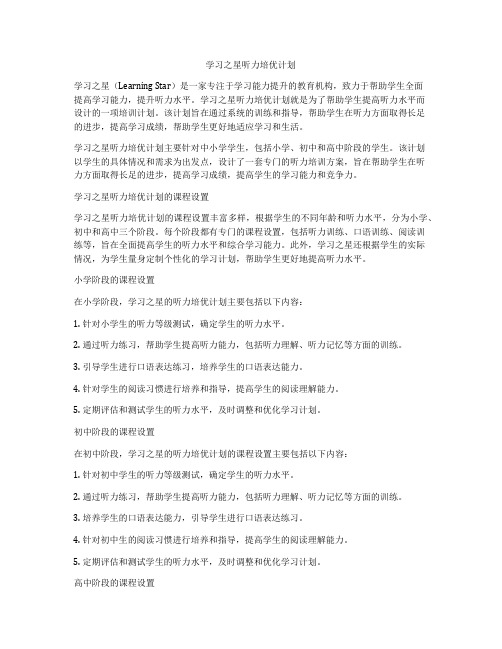
学习之星听力培优计划学习之星(Learning Star)是一家专注于学习能力提升的教育机构,致力于帮助学生全面提高学习能力,提升听力水平。
学习之星听力培优计划就是为了帮助学生提高听力水平而设计的一项培训计划。
该计划旨在通过系统的训练和指导,帮助学生在听力方面取得长足的进步,提高学习成绩,帮助学生更好地适应学习和生活。
学习之星听力培优计划主要针对中小学学生,包括小学、初中和高中阶段的学生。
该计划以学生的具体情况和需求为出发点,设计了一套专门的听力培训方案,旨在帮助学生在听力方面取得长足的进步,提高学习成绩,提高学生的学习能力和竞争力。
学习之星听力培优计划的课程设置学习之星听力培优计划的课程设置丰富多样,根据学生的不同年龄和听力水平,分为小学、初中和高中三个阶段。
每个阶段都有专门的课程设置,包括听力训练、口语训练、阅读训练等,旨在全面提高学生的听力水平和综合学习能力。
此外,学习之星还根据学生的实际情况,为学生量身定制个性化的学习计划,帮助学生更好地提高听力水平。
小学阶段的课程设置在小学阶段,学习之星的听力培优计划主要包括以下内容:1. 针对小学生的听力等级测试,确定学生的听力水平。
2. 通过听力练习,帮助学生提高听力能力,包括听力理解、听力记忆等方面的训练。
3. 引导学生进行口语表达练习,培养学生的口语表达能力。
4. 针对学生的阅读习惯进行培养和指导,提高学生的阅读理解能力。
5. 定期评估和测试学生的听力水平,及时调整和优化学习计划。
初中阶段的课程设置在初中阶段,学习之星的听力培优计划的课程设置主要包括以下内容:1. 针对初中学生的听力等级测试,确定学生的听力水平。
2. 通过听力练习,帮助学生提高听力能力,包括听力理解、听力记忆等方面的训练。
3. 培养学生的口语表达能力,引导学生进行口语表达练习。
4. 针对初中生的阅读习惯进行培养和指导,提高学生的阅读理解能力。
5. 定期评估和测试学生的听力水平,及时调整和优化学习计划。
abcreading学习规划计划
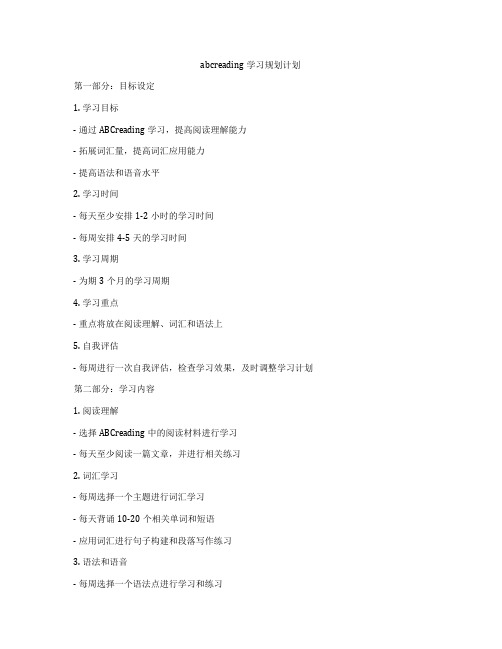
abcreading学习规划计划第一部分:目标设定1. 学习目标- 通过ABCreading学习,提高阅读理解能力- 拓展词汇量,提高词汇应用能力- 提高语法和语音水平2. 学习时间- 每天至少安排1-2小时的学习时间- 每周安排4-5天的学习时间3. 学习周期- 为期3个月的学习周期4. 学习重点- 重点将放在阅读理解、词汇和语法上5. 自我评估- 每周进行一次自我评估,检查学习效果,及时调整学习计划第二部分:学习内容1. 阅读理解- 选择ABCreading中的阅读材料进行学习- 每天至少阅读一篇文章,并进行相关练习2. 词汇学习- 每周选择一个主题进行词汇学习- 每天背诵10-20个相关单词和短语- 应用词汇进行句子构建和段落写作练习3. 语法和语音- 每周选择一个语法点进行学习和练习- 配合语音练习,提高口语和听力水平第三部分:学习方法1. 阅读理解- 阅读时要注意细节,理解文章大意- 提高阅读速度和理解能力- 阅读后进行相关练习和测试2. 词汇学习- 制定词汇表,记录每天学习的单词和短语- 背诵单词和短语,并进行拼写和应用练习- 在阅读和写作中应用所学词汇3. 语法和语音- 多做语法练习题,理解规则和用法- 与老师或同学一起进行口语练习- 记录自己的语音练习,发现问题并及时纠正第四部分:学习评估1. 学习记录- 每天进行学习记录,包括学习的内容、时间和效果- 每周进行总结,分析学习成果和问题2. 考试模拟- 每月进行一次考试模拟,评估学习效果- 分析考试成绩,找出问题并进行改进3. 老师反馈- 每周向老师汇报学习情况,接受老师的评估和建议- 老师根据学习情况做出针对性的指导和布置作业第五部分:学习改进1. 根据学习记录和评估结果,及时调整学习计划,调整学习重点2. 多参与学习小组或者活动,和同学进行交流学习、分享经验3. 多收集学习资料和信息,丰富学习内容,提高学习动力和兴趣第六部分:总结通过这个ABCreading的学习规划,我将能够全面提高阅读理解能力、拓展词汇量、提高语法和语音水平,提高整体英语水平。
小新星简介
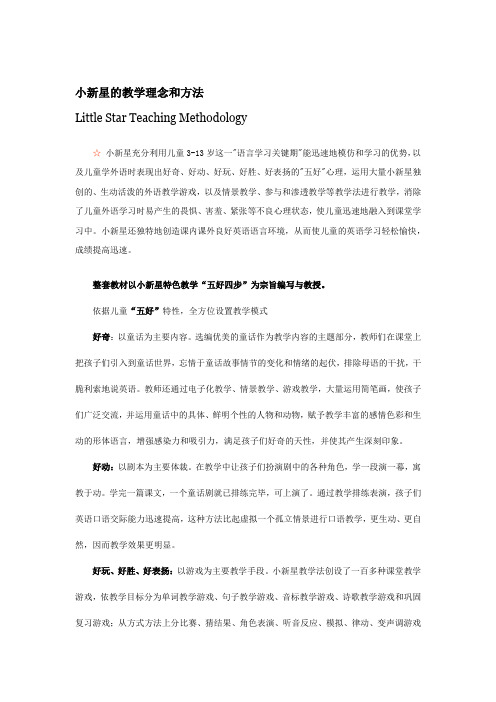
小新星的教学理念和方法Little Star Teaching Methodology☆小新星充分利用儿童3-13岁这一"语言学习关键期"能迅速地模仿和学习的优势,以及儿童学外语时表现出好奇、好动、好玩、好胜、好表扬的"五好"心理,运用大量小新星独创的、生动活泼的外语教学游戏,以及情景教学、参与和渗透教学等教学法进行教学,消除了儿童外语学习时易产生的畏惧、害羞、紧张等不良心理状态,使儿童迅速地融入到课堂学习中。
小新星还独特地创造课内课外良好英语语言环境,从而使儿童的英语学习轻松愉快,成绩提高迅速。
整套教材以小新星特色教学“五好四步”为宗旨编写与教授。
依据儿童“五好”特性,全方位设置教学模式好奇:以童话为主要内容。
选编优美的童话作为教学内容的主题部分,教师们在课堂上把孩子们引入到童话世界,忘情于童话故事情节的变化和情绪的起伏,排除母语的干扰,干脆利索地说英语。
教师还通过电子化教学、情景教学、游戏教学,大量运用简笔画,使孩子们广泛交流,并运用童话中的具体、鲜明个性的人物和动物,赋予教学丰富的感情色彩和生动的形体语言,增强感染力和吸引力,满足孩子们好奇的天性,并使其产生深刻印象。
好动:以剧本为主要体裁。
在教学中让孩子们扮演剧中的各种角色,学一段演一幕,寓教于动。
学完一篇课文,一个童话剧就已排练完毕,可上演了。
通过教学排练表演,孩子们英语口语交际能力迅速提高,这种方法比起虚拟一个孤立情景进行口语教学,更生动、更自然,因而教学效果更明显。
好玩、好胜、好表扬:以游戏为主要教学手段。
小新星教学法创设了一百多种课堂教学游戏,依教学目标分为单词教学游戏、句子教学游戏、音标教学游戏、诗歌教学游戏和巩固复习游戏;从方式方法上分比赛、猜结果、角色表演、听音反应、模拟、律动、变声调游戏等,课堂教学游戏贯穿模仿、操练、活用等教学过程的始终,给优胜者不断的表扬和鼓励。
小新星英语教学法采取听说领先,读写跟上,充分发挥儿童外语学习以视觉、听觉为主的形象思维能力。
学习之星六年级下册英语培优计划
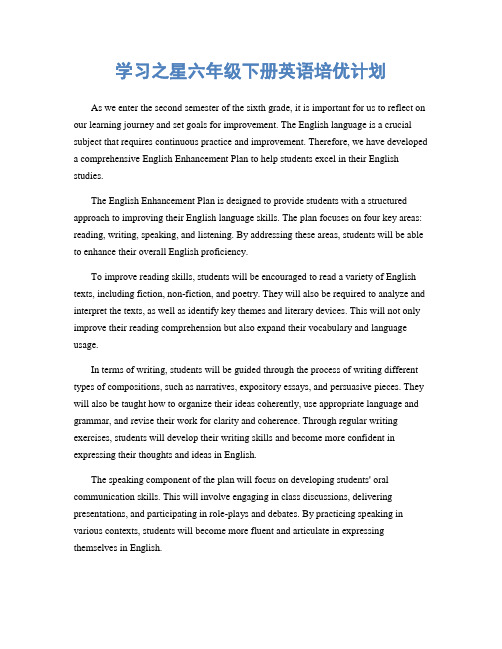
学习之星六年级下册英语培优计划As we enter the second semester of the sixth grade, it is important for us to reflect on our learning journey and set goals for improvement. The English language is a crucial subject that requires continuous practice and improvement. Therefore, we have developed a comprehensive English Enhancement Plan to help students excel in their English studies.The English Enhancement Plan is designed to provide students with a structured approach to improving their English language skills. The plan focuses on four key areas: reading, writing, speaking, and listening. By addressing these areas, students will be able to enhance their overall English proficiency.To improve reading skills, students will be encouraged to read a variety of English texts, including fiction, non-fiction, and poetry. They will also be required to analyze and interpret the texts, as well as identify key themes and literary devices. This will not only improve their reading comprehension but also expand their vocabulary and language usage.In terms of writing, students will be guided through the process of writing different types of compositions, such as narratives, expository essays, and persuasive pieces. They will also be taught how to organize their ideas coherently, use appropriate language and grammar, and revise their work for clarity and coherence. Through regular writing exercises, students will develop their writing skills and become more confident in expressing their thoughts and ideas in English.The speaking component of the plan will focus on developing students' oral communication skills. This will involve engaging in class discussions, delivering presentations, and participating in role-plays and debates. By practicing speaking in various contexts, students will become more fluent and articulate in expressing themselves in English.Lastly, the listening aspect of the plan will involve students actively listening to spoken English in different forms, such as lectures, interviews, and audio recordings. They will also be required to demonstrate their understanding through activities like summarizing, paraphrasing, and responding to questions. This will help students improve their listening comprehension and develop their ability to understand spoken English in various contexts.In addition to these four key areas, the English Enhancement Plan will also incorporate regular assessments to monitor students' progress and provide feedback for improvement. This will allow students to track their development and identify areas that require further attention.Overall, the English Enhancement Plan aims to provide students with a comprehensive and structured approach to improving their English language skills. By focusing on reading, writing, speaking, and listening, students will be able to enhance their overall English proficiency and become more confident and effective communicators in the language. Through regular practice and dedication, we believe that every student has the potential to become a star English learner in the sixth grade.。
小新星英语培训教学计划

小新星英语培训教学计划Introduction:New Star English Training Program aims to provide comprehensive and effective English language education for students of all ages. Our program is designed to improve students' language skills, build their confidence, and prepare them for success in both academic and professional settings. We offer a variety of courses and learning activities, including comprehensive language lessons, interactive games and activities, and one-on-one tutoring sessions. Our experienced and dedicated instructors are committed to helping students achieve their language learning goals and develop a lifelong love for English.Goals:The goals of the New Star English Training Program are:- To improve students' English language skills, including listening, speaking, reading, and writing- To build students' confidence in using English in both academic and everyday situations - To foster a love for learning and using the English language- To prepare students for success in school, work, and other areas of life where English proficiency is requiredCourse Offerings:We offer a wide range of courses to meet the diverse needs of our students. Our course offerings include:- General English courses for students at all levels, including beginner, intermediate, and advanced levels- Test preparation courses for standardized English exams, such as the TOEFL, IELTS, and Cambridge exams- Business English courses for professionals who need to improve their English language skills for the workplace- Conversational English courses for students who want to improve their speaking and listening skills in a relaxed and informal setting- Customized tutoring sessions for students who need individualized attention and support in specific areas of English language learningTeaching Methods:The New Star English Training Program employs a variety of teaching methods to ensure that students receive a well-rounded and effective language education. Our teaching methods include:- Interactive and engaging language lessons that focus on real-life language use and communication- Use of multimedia tools, such as videos, audio recordings, and interactive online resources, to enhance the learning experience- Small group activities and games that encourage students to practice their language skills in a fun and supportive environment- Individualized attention and support from our experienced instructors, who are dedicated to helping each student succeed- Regular assessments and feedback to help students track their progress and identify areas for improvementClass Schedule:Our classes are scheduled at convenient times for students of all ages. We offer flexible scheduling options, including daytime, evening, and weekend classes, to accommodate the diverse schedules of our students. Our classes are typically held twice a week, with each class session lasting 90 minutes. This schedule allows students to make steady progress in their language learning while still having time for other responsibilities and activities.Instructors:The instructors at New Star English Training Program are experienced, qualified, and passionate about teaching English. Our instructors have a strong command of the English language and are skilled in delivering effective and engaging language lessons. They are committed to creating a positive and supportive learning environment for their students and take pride in helping students achieve their language learning goals. Our instructors are also dedicated to their own professional development and regularly participate in training and professional development opportunities to ensure that they remain current with the best practices in English language teaching.Student Support:At New Star English Training Program, we are committed to providing comprehensive support for our students. In addition to our regular language courses, we offer a range of support services to help students succeed in their language learning journey. These support services include:- Access to a well-stocked library of English language books, magazines, and other resources- One-on-one tutoring sessions with experienced instructors for students who need extra support in specific areas of language learning- Study groups and discussion forums for students to practice their English language skills with their peers- Workshops and guest lectures on a variety of topics related to language learning and English language use- Regular progress reports and feedback to help students track their language learning progress and set goals for improvementConclusion:The New Star English Training Program is committed to providing high-quality language education for students of all ages. Our comprehensive and effective courses, experienced and dedicated instructors, and supportive learning environment make us the ideal choice for students who want to improve their English language skills and achieve their language learning goals. Whether you are a beginner who wants to start learning English or an advanced student who wants to refine your language skills, we have the resources and expertise to help you succeed. Join us at New Star English Training Program and take your language skills to the next level!。
小新星英语教学目标
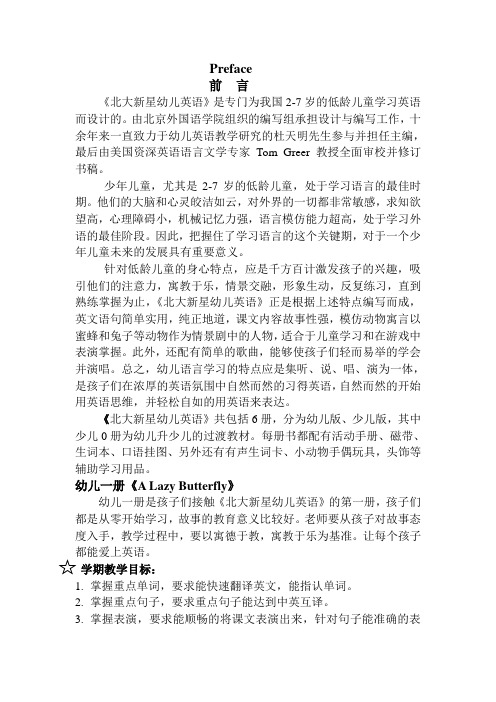
Preface前言《北大新星幼儿英语》是专门为我国2-7岁的低龄儿童学习英语而设计的。
由北京外国语学院组织的编写组承担设计与编写工作,十余年来一直致力于幼儿英语教学研究的杜天明先生参与并担任主编,最后由美国资深英语语言文学专家Tom Greer 教授全面审校并修订书稿。
少年儿童,尤其是2-7岁的低龄儿童,处于学习语言的最佳时期。
他们的大脑和心灵皎洁如云,对外界的一切都非常敏感,求知欲望高,心理障碍小,机械记忆力强,语言模仿能力超高,处于学习外语的最佳阶段。
因此,把握住了学习语言的这个关键期,对于一个少年儿童未来的发展具有重要意义。
针对低龄儿童的身心特点,应是千方百计激发孩子的兴趣,吸引他们的注意力,寓教于乐,情景交融,形象生动,反复练习,直到熟练掌握为止,《北大新星幼儿英语》正是根据上述特点编写而成,英文语句简单实用,纯正地道,课文内容故事性强,模仿动物寓言以蜜蜂和兔子等动物作为情景剧中的人物,适合于儿童学习和在游戏中表演掌握。
此外,还配有简单的歌曲,能够使孩子们轻而易举的学会并演唱。
总之,幼儿语言学习的特点应是集听、说、唱、演为一体,是孩子们在浓厚的英语氛围中自然而然的习得英语,自然而然的开始用英语思维,并轻松自如的用英语来表达。
《北大新星幼儿英语》共包括6册,分为幼儿版、少儿版,其中少儿0册为幼儿升少儿的过渡教材。
每册书都配有活动手册、磁带、生词本、口语挂图、另外还有有声生词卡、小动物手偶玩具,头饰等辅助学习用品。
幼儿一册《A Lazy Butterfly》幼儿一册是孩子们接触《北大新星幼儿英语》的第一册,孩子们都是从零开始学习,故事的教育意义比较好。
老师要从孩子对故事态度入手,教学过程中,要以寓德于教,寓教于乐为基准。
让每个孩子学期教学目标:1.掌握重点单词,要求能快速翻译英文,能指认单词。
2.掌握重点句子,要求重点句子能达到中英互译。
3.掌握表演,要求能顺畅的将课文表演出来,针对句子能准确的表演,动作到位。
- 1、下载文档前请自行甄别文档内容的完整性,平台不提供额外的编辑、内容补充、找答案等附加服务。
- 2、"仅部分预览"的文档,不可在线预览部分如存在完整性等问题,可反馈申请退款(可完整预览的文档不适用该条件!)。
- 3、如文档侵犯您的权益,请联系客服反馈,我们会尽快为您处理(人工客服工作时间:9:00-18:30)。
Ellie教学进度表(9月)教学计划备注周次教学内容(扩展内容)第一周复习领B Lesson1—Lesson7 Hello, bees/flowers第二周Lesson8 I can play football.1:元音or,al—/ɔ:/,辅音dr—/dr/ tr—/tr/2:I can read 含元音字母组合al,or 的单词拼读3;I can learn 单词与句型替换4:I can talk 课文听力训练1.make honey. They are working.2.This is句型和Here is句型的运用第三周Lesson9 How many rabbits are there?1:元音ar—/ɑ:/,辅音ds—/dz/ ts—/ts/2:I can read 含元音字母组合ar的单词拼读3;I can learn 单词与句型替换4:I can talk 课文听力训练。
1.I’m hungry。
2.grandfather,sister,brother的词汇扩展。
Begood.be careful的提前输入第四周Lesson9 and Lesson101:I can talk 课文听力训练。
(Lesson9)1.动物单词的扩展。
2.食物的单词输入。
E.g.水果单词等2:元音ir ur or—/ ɜ:/,辅音—j/dʒ/(Lesson10)3: I can read 含元音字母组合ar的单词拼读4:I can learn 单词第五周Lesson10 She is a worker.1:I can learn 句型替换2:I can talk 课文听力训练。
1.食物的单词的扩展。
2.pretty good和pretty face的区分。
small和big的对比,bad和good的对比。
What+形容词+名词的练习第二周(10.8) A Lazy Fly第五次课:(1)口语:What’s your name? My name is XX(2)课文:Thank you!Not at all.Goodbye!LRRH第五次课:(1)口语: How are you? Fine. How about you? I’m good.(2)课文: The wolf goes to Grandmother’s house. Kn ock! Knock! Whois it? It’s me! Little Red Riding Hood! Come in! Come in! Oh, no! I willeat you! Oh delicious!领跑L4:(1)辅音字母b,p,m,f,d,t,n,l,g,k,h,r,s,v,w,y,z在单词中的读音。
(2)句型:Hello,I’m……1.full的提前输入2.。
XX goes to sp.(花园,地名等)第三周(9.17) A Lazy Fly第六次课:(1)口语:How old are you? I am four(2)课文:Oh, I’m full.I’m sleepy.LRRH第六次课:(1)口语: Hello! Let’s play ping-pong! OK!(2)课文: Hewaits for little red riding hood. Knock! Knock! Who is it? It’s me. Comein! Come in! Oh, what big ears! I can listen to your sweet voice.领跑L5:(1)拼读含字母a的闭音节词(2)四会词:cap,dad,bag,hat,cat.(3)句型:What’s this/that? It’s……1.数字的扩展2.球类的扩展。
I can……句型的扩展第四周(9.24) A Lazy Fly复习。
LRRH第七单元:(1)口语:Good morning, boys and girls. Good morning,Miss White.(2)课文:Oh, what big eyes! I can see your pretty face. Oh,what big hands! I can hug you, dear. What a big mouth! I can … eat you!领跑L6:(1)拼读含字母e的闭音节词(2)四会词:hen,1.无2.what+a/an+形容词+名词的扩展bed,desk,red,egg,pen(3)句型:Is it a fat hen? Yes,it is./No,it isn’t第一周(11.6) A Lazy Fly第七单元:(1)口语:What’s this?It’s a bee.Great(2)课文:Look,birds come.What a lazy fly!LRRH第八单元:(1)口语:May I come in? Come in, please.(2)课文: Oh,no! He eats Little Red Riding Hood. I’m sleepy. ZZZ… A hunter hears thewolf. Who is it? The wolf is sleeping.领跑L8:(1)元音字母i在闭音节单词中的发音(2)含元音字母i的闭音节单词的拼读(3)Is it a fat pig? (4)四会单词gift,milk,pig,thin,big 1.动物单词的扩展。
E.g. fly, bird, horse, rabbit, elephant, kangaroo和Come与comes的区分第二周(11.13) A Lazy Fly第八单元:(1)口语:Glad to meet you!Glad to meet you,too!What’s this?It’s a cat.Great!(2)课文:Meow.Meow.Meow.The cat is working.Oh,I’m hungr y.LRRH第九次课:(1)口语:How old are you? I’m ______.(2)课文: What abig stomach! Grandmother and LRRH are inside. I must hurry. Thescissors. Cut, cut, cut. Thank you! The wolf is still sleeping.领跑L9:(1)元音字母o在闭音节单词中的发音(2)含元音字母o的闭音节单词的拼读(3)Is it in a box? (4)四会单词frog, dog, doll, in, on, box 1.情景表演扩展2.sleepy和sleeping的区别第三周(11.20) A Lazy Fly第九次课:(1)口语:Good morning.(2)课文:Go away,Lazy fly!The cat is angry.LRRH第十次课:(1)口语What’s this? It’s an apple.(2)课文: They put instones. One, two, three …. They sew…. They wait. He wakes up. Mystomach is so heavy! You big bad wolf! Help! Help! Don’t shoot!领跑L10:(1)元音字母u在闭音节单词中的发音(2)含元音字母u的闭音节单词的拼读(3)Can you jump? (4)四会单词duck, bus, jump, swim, run, hop 1.Good morning & good afternoon & goodnight的应用.happy和angry的对比2.数字的扩展。
第四周(11.27) A Lazy Fly第十次课:复习。
LRRH第十一次课:(1)口语What’s that? It’s a rabbit What color is it? It’swhite.(2)课文: He runs out. He runs slowly. Whoops! He falls down.He can’t swim. The wolf is dead! Yeah!领跑L11:(1)拼读含有元音字母a,e,i,o,u的闭音节单词(2)灵活运用已学句型1.无2.颜色的扩展。
Slowly&quickly的对比第一周(12.4) A Lazy Fly第十次课:(1)口语Good afternoon!(2)课文Quack.Quack.Quack.The duck is working.Oh,I’m hungry.Go away, Lazy fly!LRRH第十二次课:(1)口语:What’s in the picture? It’s a cat.What coloris it? It’s brown.(2)课文: The hunter goes to town. Grandmother andLRRH have the cookies and juice. They have a good time. 1.复习早上好,下午好,晚上好。
2.领跑L12:(1)元音字母a在开音节单词中的发音(2)含元音字母a的开音节单词的拼读(3)I can make a cake. (4)四会单词face, cake, make, gate, plane, lake第二周(12.11) A Lazy Fly第十一次课:复习前面内容。
LRRH第十三次课:(1)口语:Is this a pencil?No, it isn’t. Is this a pen?Yes, it is.(2)复习课文.领跑L13:(1)元音字母e在开音节单词中的发音(2)含元音字母e的开音节单词的拼读(3)Is he Pete? (4)四会单词he, she, we, hot, tea 1.无2.生活用品单词的扩展第三周(12.18) A Lazy Fly第十二次课:(1)口语:What color is it?It’s red(white,blue,yellow)(2)课文:Cheep.Cheep.Cheep.The chicken is working.Oh,I’m hungry.Go away,Lazy fly!Thechicken is angry.领跑L14:(1)元音字母i在开音节单词中的发音(2)含元音字母i的开音节单词的拼读(3)Let’s ride a bike. (4)四会单词name, fly a kite, ride a bike,slide1.颜色的扩展第四周(12.25) A Lazy Fly第十三次课:(1)复习口语(2)Oh,I’m hungry.I’m cold.领跑L15:(1)元音字母o在开音节单词中的发音(2)含元音字母o的开音节单词的拼读(3)This is Rose. (4)四会单词this, nose, Coke, go home, closeCold & hot 的对比第一周(1.8) A Lazy Fly第十三次课:(1)复习口语(2)课文:It rains and rains领跑L16:分清元音字母a,e,i,o,u在开闭音节中的不同读法1.天气第二周(1.16) A Lazy Fly第十四次课:(1)复习口语(2)课文:The lazy fly dies. 无第三周总结本学期工作,做好春季招生宣传。
